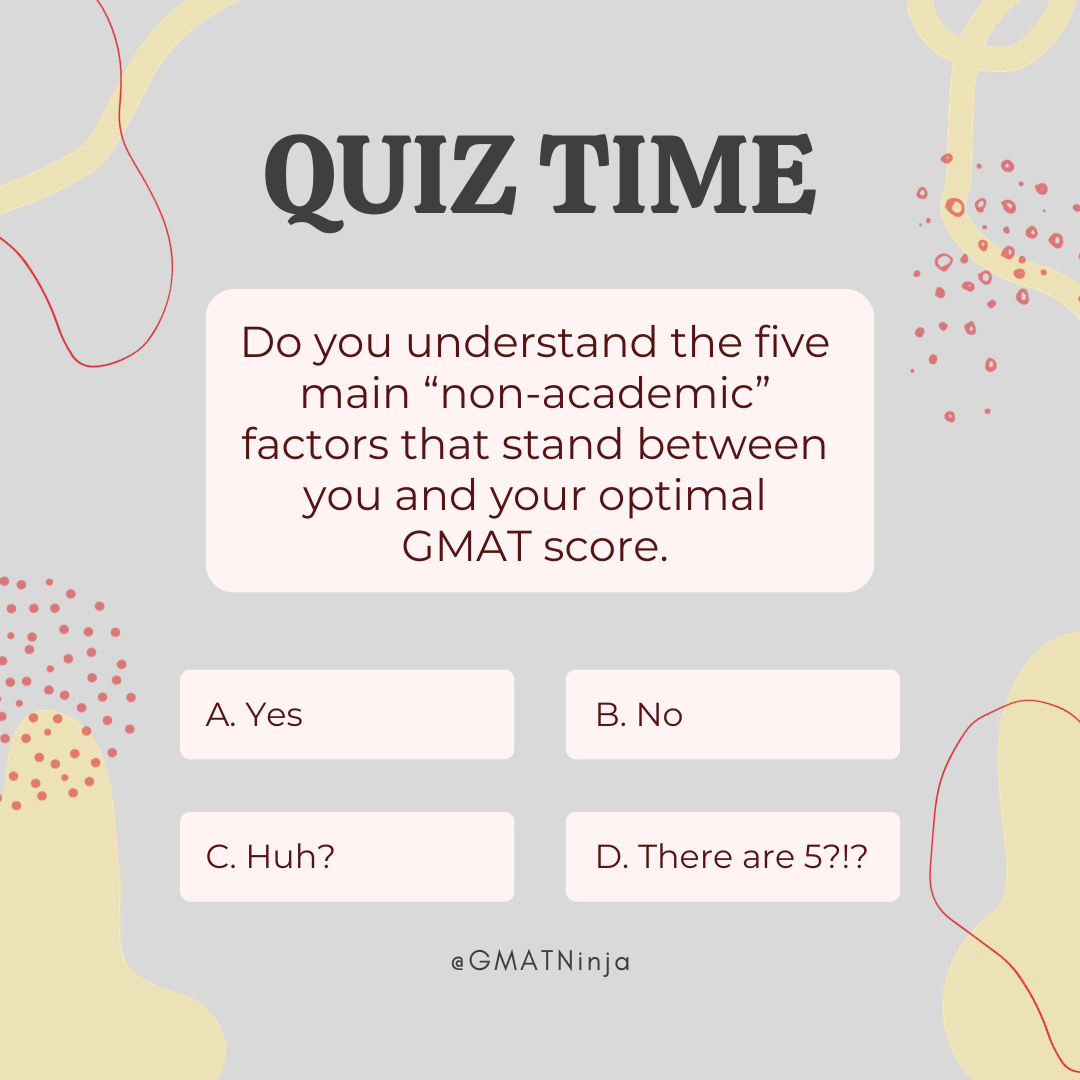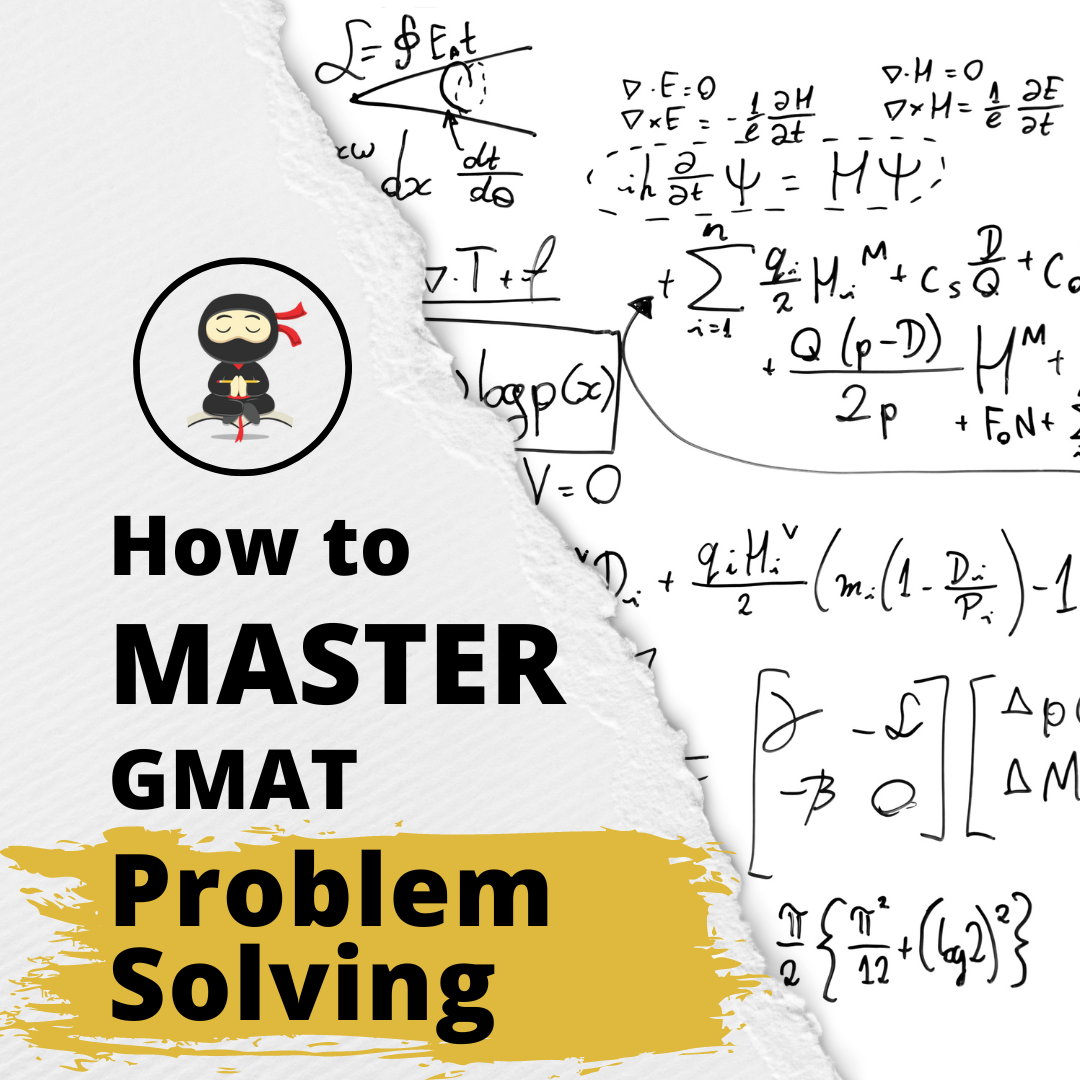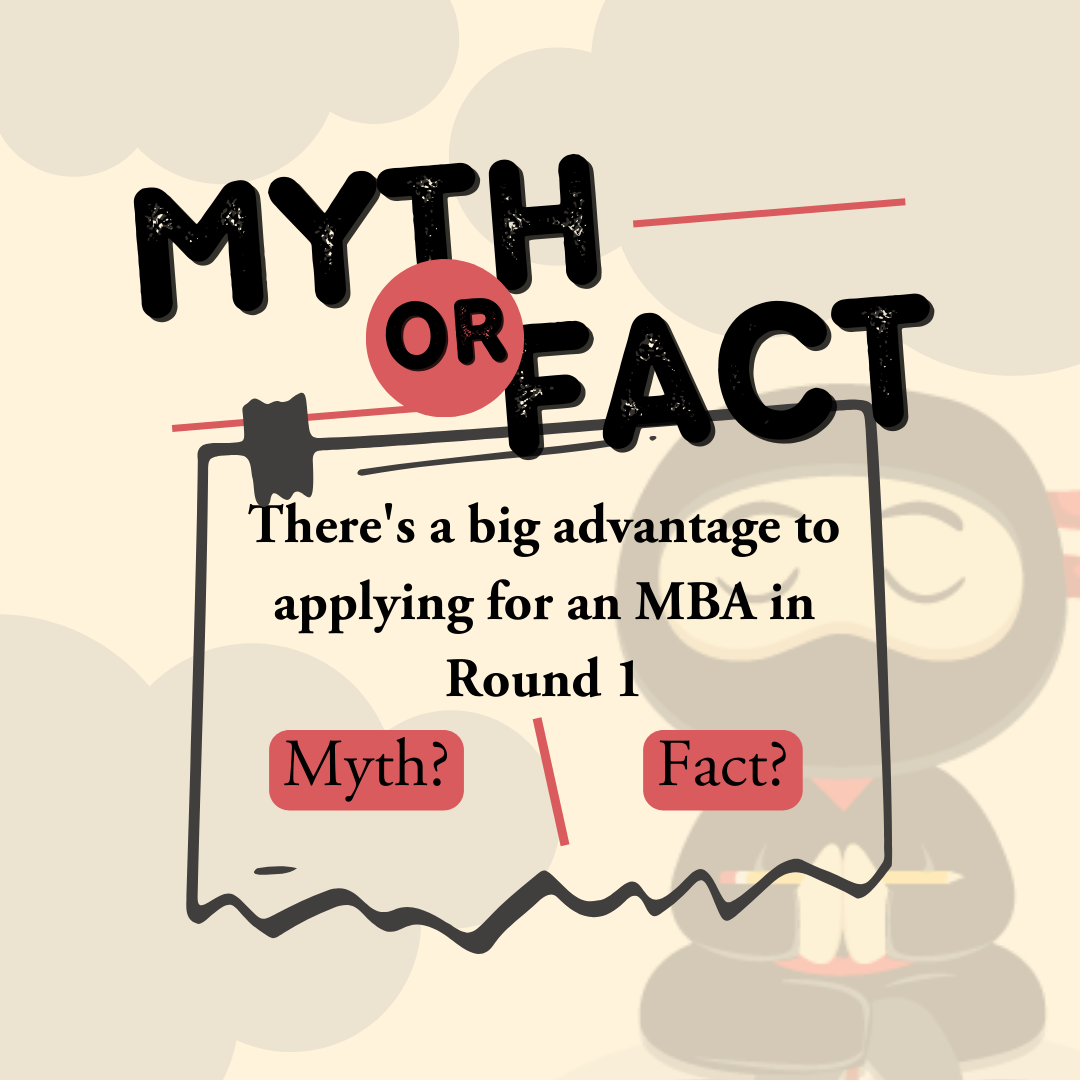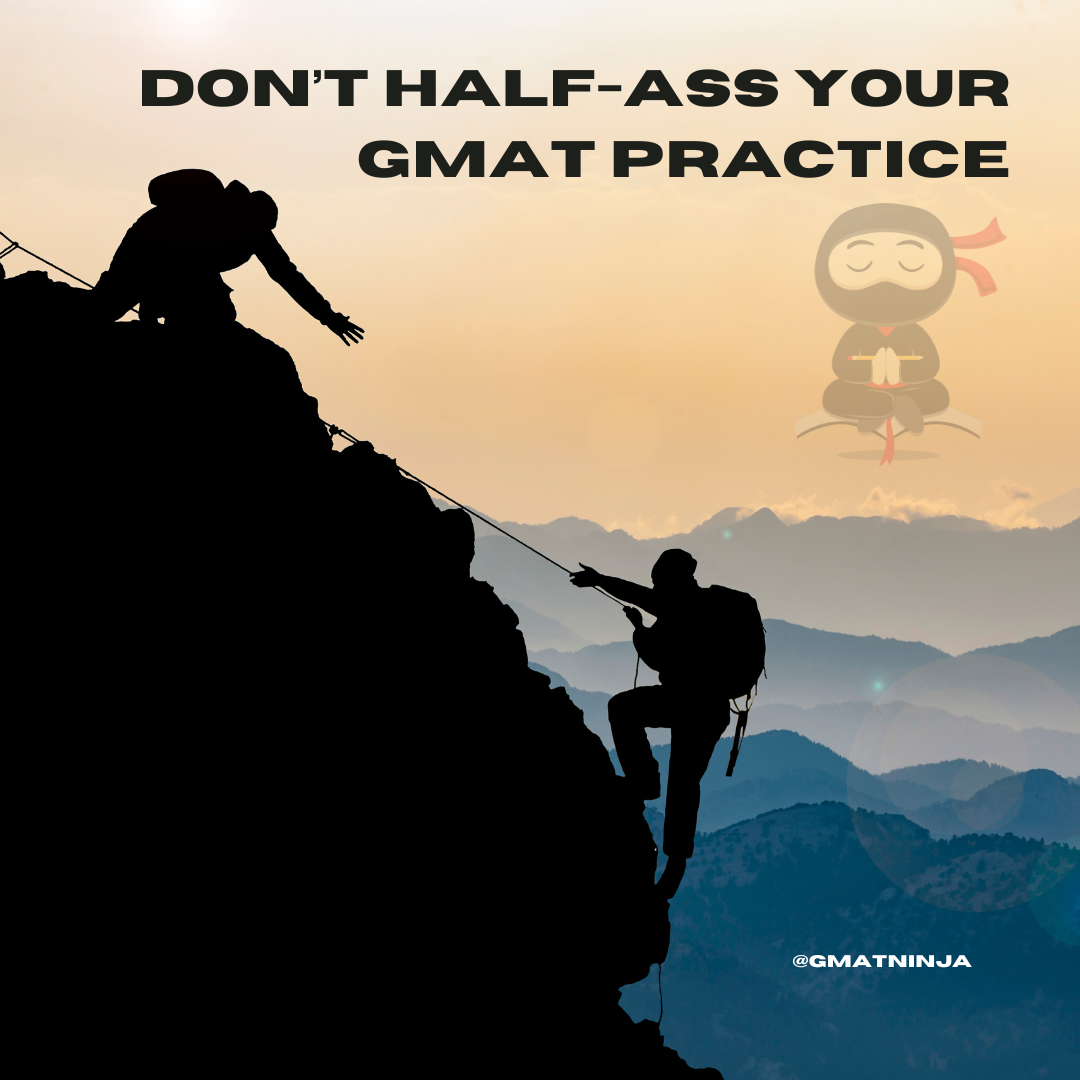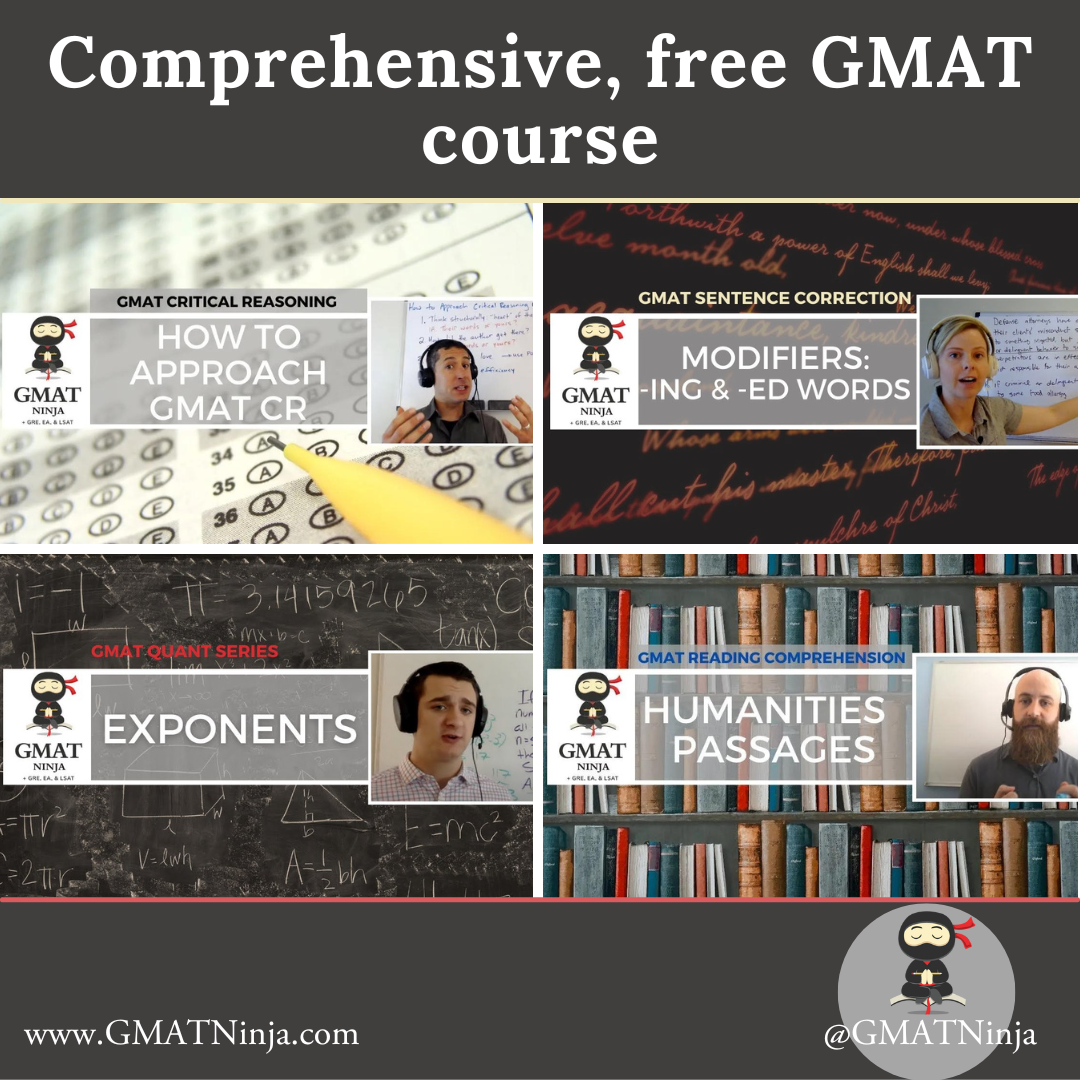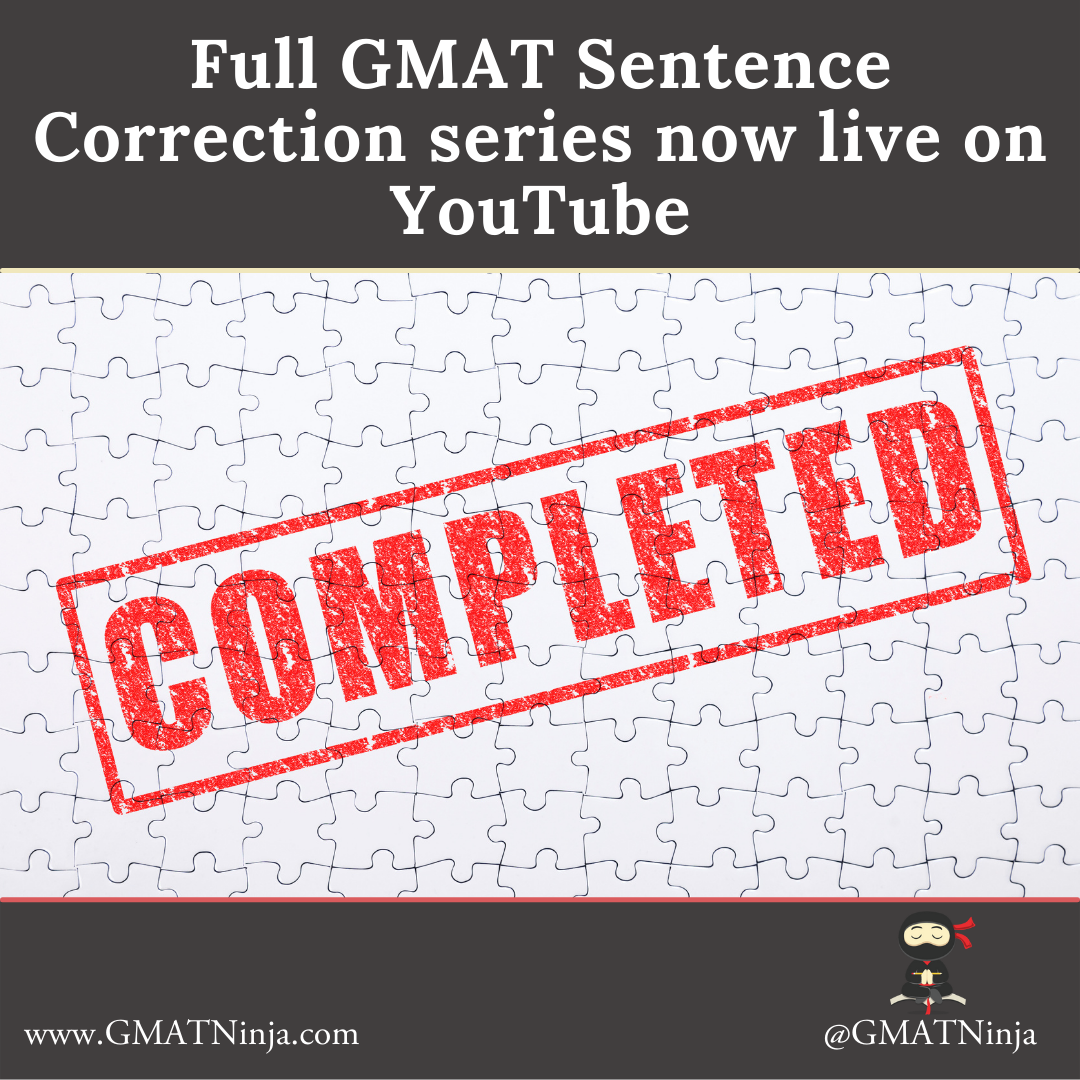GMAT, GRE, & EA Tips on Instagram
Want tips and advice on the GMAT (or GRE or Executive Assessment), delivered straight to your phone? We’ve got you covered on Instagram and Twitter.
You can find our GMAT Video Series on our YouTube page.
We’ll repost highlights from our Instagram gallery on this page. So if you’re looking for a GMAT, GRE, or EA article (or video) that we’ve posted on social media, the links will be available here.
HOW GMAT & GRE TESTING ACCOMMODATIONS REALLY WORK
One of the biggest surprises in my 20 plus years of tutoring is we meet test takers all the time who qualify for extra testing time and refuse to apply for accommodations. So today I want to do a little bit of myth busting and talk about the reasons why you should apply and who qualifies. Now, any number of physical or mental conditions can qualify you for extra testing time.
So it could be something that's mental or psychological, anxiety disorders, ADHD, or dyslexia. It could also be physical — a visual impairment for instance. Even something like irritable bowel syndrome. If you can't sit in that testing room and focus for the full test, you may well qualify for accommodations.
Now, what I hear from test takers all the time: Hey, Charles, I don't want the unfair advantage. Really important thing -- it is not an unfair advantage. It levels the playing field. Those accommodations are protected under U.S. law. So if you do qualify, you're going to have to submit some really serious documentation and have a diagnosed condition.
But if you do have that condition, you deserve those accommodations and you should never hesitate to apply.
SHOULD YOU QUIT YOUR JOB TO STUDY FOR THE GMAT?
One of the fantasies we hear all the time from our students, wouldn't it be great if I could quit my job study for the GMAT full time? I'd do great. Bad news, guys, that usually doesn't work out -- three big reasons why.
First of all, your MBA application is going to be stronger if you're applying with a full time job already. I'm not saying you can't get in when you're unemployed. We see people do it all the time. I'm just saying it is going to give you a little bit of a hit on your MBA application odds.
Second, and more importantly, we see applicants who are unemployed put much more pressure on themselves than they often get anxious. If you already have test anxiety, you might actually struggle to perform at your best if the GMAT is your sole focus.
Third, we actually see students who are unemployed study less for the GMAT. The reason why is often you get out of rhythm. You don't have a nice, consistent daily schedule. You're sitting there in the morning going, I got all day in front of me to study -- I'll do it later. The procrastination sets in, and next thing you know it's evening. You're tired. You're not studying that much.
I'm not saying you shouldn't quit your job to study for the GMAT. I'm just saying, if you do it, please be careful.
CRITICAL REASONING: DON’T READ THE QUESTION FIRST
This video is about why you shouldn't read the question first on GMAT Critical Reasoning. At first glance, this might seem like a reasonable strategy. Let's say you read the question and see you're looking for a weakener. Well, that's good to know, right? Now when you read the passage, you can try to figure out the best way to weaken the argument, which should help you spot the correct answer, right?
Well, unfortunately, there's dozens of ways to strengthen or weaken any particular argument. And when writing the correct answer, test makers might deliberately pick a strengthener or weakener that isn't the first thing that you'd think of. So, if you go in there biased, you might miss the correct answer entirely.
Or you might get tempted by a wrong answer that superficially resembles what you'd been thinking of. So instead of reading the question first, start by anchoring yourself in the passage. Then, after reading the question, evaluate each answer choice based on its own merits, regardless of whether it resembles something you thought of ahead of time.
And if you can hold yourself to that process, you're in good shape to improve your CR accuracy.
CLOSE COUNTS IN RUSSIAN ROULETTE, NOT GMAT VERBAL
One of the things I hear from test takers all the time, I'm down to the last two answer choices on GMAT Verbal. That must mean that I'm really, really close to a breakthrough. Bad news for you guys, close counts in Russian Roulette, it counts in Horseshoes, it does not count in GMAT Verbal, and here's the reason why.
Generally speaking, the question writers come up with only one really great, tempting wrong answer. Then, of course, there's the right answer, and they kind of write three others. Sometimes they get one that's really tempting, usually not. So if you are struggling on a question, odds are really good that you're going to be down to the last two right answer and that really tempting wrong answer.
Generally speaking, when that's happening to you over and over, you're missing a lot of those questions struggling between those last two. It's a sign that you haven't understood the passage fully on reading comp or critical reasoning. So if this is happening to you, you're down to those last two, and a lot of the time you pick the wrong one, I want you to really focus on your process.
See if you can get better at understanding those passages. If you can do that, I promise good things will happen, and you'll be close a lot less often and write a whole lot more.
SIGNS YOU HAVE TEST ANXIETY
What are some signs that you might be struggling with test anxiety?
Well, it's normal to feel nervous when you take the GMAT or GRE. So how do you tell the difference between harmless test day nerves and damaging test anxiety? Bottom line — it’s when the pressure of the test is causing you to underperform.
In some cases, the symptoms are easily recognizable, such as racing hard or sweaty palms, but in other cases they can be more subtle. Even if someone doesn't feel consciously nervous as they step into the testing room, they may find themselves unable to think clearly. Fairly straightforward language may all of a sudden be difficult to comprehend. Questions they could normally tackle all of a sudden seem wildly complex.
So if any of that sounds familiar, or if you found your scores taking an inexplicable nosedive on test day, you might be suffering from test anxiety. And while there's many ways to deal with it, including mental performance coaching, mindfulness meditation, changes to your sleep and exercise schedule, the first step is to recognize that it's happening so you can tackle it head on.
WHAT TO FOCUS ON THE WEEK BEFORE YOUR EXAM
How should you spend that last week or so before heading into the testing room to take your GMAT or GRE exam? Well, your goal is to show up relaxed, confident, and mentally sharp. So here's some things to keep in mind.
First, good sleep is essential. Research has shown that getting seven to nine hours per night is really important for performing well on cognitive tasks and consolidating memories, so you really want to make sure you check that box.
Second, consistent diet is also important. Your goal is to maintain a consistent energy level, so avoid skipping meals, avoid relying too much on caffeine and sugar, and above all, no drastic changes.
Third, exercise is also be really important. Even if it's only 10 minutes per day to get your heart rate up, that can help reduce stress and boost your energy.
When it comes to studying, you want to avoid cramming. Your goal now is to just maintain the skills you already have, stay warm while keeping your batteries fully charged. And if you do all that, you're in good shape to perform your best on test day.
In preparing for a reading comp on the GMAT and GRE, what if you find yourself missing a lot of questions on the author's primary purpose? What can you do to improve? Well, here are three things to consider. First, if you're asked about the author's primary purpose, it's not enough to be a true statement.
Very often you'll find an answer choice with correct information about the passage that simply isn't the author's main idea. Second, avoid shortcuts such as assuming that the author's primary purpose must be stated in the first paragraph or the last paragraph because, in reality, the author's main thesis could be stated anywhere throughout the passage.
And last, keep in mind the difference between topic and primary purpose. The topic of a passage might be something like, the evolution of birds from dinosaurs. But the primary purpose of the author is probably something bigger picture, such as advocating for a theory, or evaluating the evidence for a certain claim.
Whatever the case, make sure you're differentiating between topic and primary purpose. If you keep those three pitfalls in mind, you'll likely find your accuracy improving.
When analyzing answer choices on the GMAT and GRE verbal sections, one pitfall test takers commonly run into is word matching. In other words, getting tempted by an answer choice simply because it repeats words from the passage. As you've probably noticed though, wrong answer choices often lift words and phrases directly from the text, so that alone isn't a good reason to pick an answer choice.
At the same time, you don't want to reject an answer choice simply because it fails to repeat words from the passage. It's perfectly possible that an answer choice addresses the question really well, but using different language than what you encountered in the text. So instead of word matching, try to engage with the answer choice.
Ask yourself, does the meaning it provides answer the question, regardless of how many words it repeats or fails to repeat from the passage? Now when the answer choices get really dense and wordy, that's easier said than done. But if you're following that process, you're on the right track to improving your verbal performance.
One question we often get from our students is, How much should I study each day when preparing for the GMAT or GRE? As a general rule, our answer is, Avoid marathon cramming sessions where you study to the point of exhaustion. If you were preparing for a biology or history exam, then six hour studying slogs might be a good idea.
But the GMAT and GRE aren't about regurgitating information. They're about honing a methodical approach, thinking on your feet, applying a fairly limited set of knowledge to a devilishly varied series of questions. The problem with marathon study sessions is they fail to develop those skills. In fact, if you get too exhausted, say by hour three, you might end up reinforcing the very bad habits you're trying to correct, such as making careless mistakes.
So instead of epic quant and verbal sessions, try short but intense bursts of studying that mimic the actual rhythm of the GMAT and GRE. That way, you can stay focused on the skills that really matter.
This video's about why you shouldn't try to maximize your efficiency on the GMAT or GRE verbal sections by forcing yourself to read really, really fast. So, it's understandable that someone might try this approach. After all, if you read any given passage faster, you'll get through the verbal section as a whole faster, right?
Not necessarily. First, if you're reading too fast, you won't absorb the information very well. Which will cause the questions to take longer, cancelling out any gains you might have made. And just as bad, you'll probably get more questions wrong. So, how should you improve your efficiency? Well, while there's many ingredients to good verbal process, one key idea is to engage deeply with what you're reading.
Because if you're well prepared for the questions, you'll not only get more right, they'll end up going faster as well. Bottom line, if you're concerned about your efficiency on the verbal sections, Resist the temptation to read too fast. Instead, try to engage deeply with the text to maximize both your accuracy and your efficiency.
Here is a quick rundown on how to manage your time on GMAT Quant. First, always read each question twice, because it is so easy just to misread the question. Second, think through your options for solving the question. Now, at this point you're not actually solving anything, you're just thinking through your potential solution path.
Third, ask yourself whether you have a plan that is going to get you to an answer in under three minutes. If the answer is no to that question, guess, move on. If the answer is yes, carefully solve through the question. By following this strategy, you'll shift your time away from wasting time on hard questions and toward solving three questions that you actually know how to do.
Now, life isn't perfect, and sometimes you end up tangled with a question that is harder than you thought it might be. At that point, all you can do is make a call, is it worth your time or is it not, and be prepared to guess as needed. Ideally though, you'll make those decisions early on, and you'll take charge of your quant section by deciding which ones to solve.
What should you do during your break at the GRE or GMAT test center? For most students, we recommend that you use the bathroom, get a drink of water, maybe have a snack and do some deep breathing. But most importantly, what we recommend is to treat the break as if it's about three minutes shorter than the actual allotted time.
Make sure that you have time to get back and be at the desk and ready to go by the time your next section starts. Sometimes there are delays in getting checked back into the test room, so you just want to give yourself some wiggle room to go through that process and get back in time for your next section.
Should you have caffeine on your GMAT or GRE test day? There's no one right answer for everyone, but here are a couple of things to consider. First, caffeine does improve mental performance for lots of people. It can increase your focus and reduce your reaction time, which sounds great.
On the other hand, caffeine can also make you feel jittery and anxious, and that's particularly true for people who are already anxious about their test, or who are just not regular caffeine users. One option that you have to reduce those jitters while still increasing your focus is to pair caffeine with something called L theanine.
L theanine naturally occurs in green tea, so you can just have that, um, or you can get an L theanine supplement and just have your coffee plus your L theanine. Most importantly, don't make any drastic changes on test day. If you are a regular drinker of caffeine, continue to drink it. If you are not, don't start on test day.
First, practice anything that you want to change on your homework, see how it works, and then go into the test room with your plan.
First-round MBA deadlines won’t be here for another eight months or so. You still have plenty of time to worry about the GMAT or EA and your MBA applications, right? As crazy as it may sound, you should probably think about starting your GMAT or EA prep now. If your goal is to produce the best MBA or EMBA applications you possibly can, then summer might be too late to start. Click here to find out why.
Happy New Year from all of us at GMAT Ninja!!
We hope 2024 brings you all the success you could hope for, whether that’s hitting your target GMAT score, getting into an amazing MBA program, or facing your anxiety and booking that test date. Or eating your bodyweight in baked goods.
Happy 2024!
Happy holidays from the team at GMAT Ninja! However you celebrate the holiday season, we hope you’ve had a great time.
As professional tutors, we’d recommend you take at least some time away from the GMAT to eat your bodyweight in turkey and pastries (we certainly have!), and we hope all your GMAT wishes come true in the new year!
The arrival of the new GMAT Focus Edition means the style of the exam is changing. What isn’t changing, though, is how anxious test-takers sometimes feel during the exam. Many test-takers experience an unpleasant mix of mental and physical anxiety symptoms that prevent a great GMAT performance. Click here for our guide on how to overcome GMAT test anxiety.
Let’s say that you’re in the middle of the GMAT or GRE, and you start to feel anxious or overwhelmed. There’s a tool that you can use to bring yourself back down to a calmer baseline called the “physiological sigh.” This is a pattern of breathing that consists of two inhales, followed by a long exhale.
In the words of Dana, one of our veteran GMAT and GRE tutors: “I use this all of the time myself in the test room, but also in other stressful situations, like a high stakes point in a volleyball game or before a grad school presentation.” Check out the video to see how you could benefit from testing out the “physiological sigh.” Thanks to @ hubermanlab for all the info on this. For more, check out the Huberman Lab podcast, which is an excellent resource for all kinds of performance tips.
In our lives as GMAT Club’s resident verbal experts, we’ve literally been asked this question hundreds of times: “How can I improve on GMAT Critical Reasoning?” This will arguably become even more important on the new GMAT Focus Edition, where CR will make up a larger proportion of your GMAT score. Click here for an honest, long(!), gimmick-free guide to improving on GMAT CR.
We understand that it can be a big decision to take on a GMAT tutor. Sometimes it can help to see what other people think before you decide to jump in. We’ve got over 50 five-star reviews on @ GMATClub, so click here to see lots of verified reviews from some of our other students who were “beyond satisfied” with their progress, like avb27.
Let’s suppose that you’ve collected a list of local GMAT tutors. (And let’s suppose that you’re not looking for an online GMAT tutor, otherwise you would have contacted us, right? Um… right?) So how, exactly, should you go about figuring out which private GMAT tutors actually know what they’re doing? Click here for our guide on how to find a good private GMAT tutor.
We don’t just do tutoring…You might not know this, but we’ve quietly offered MBA admissions consulting for more than 15 years. Following the amazing feedback we received on our comprehensive, free GMAT video course on YouTube, we’ve started releasing videos on MBA admissions, too.
Do you ever wonder about any of these things? 1) How should you decide what MBA programs to apply to? 2) What are some common mistakes applicants make when selecting target MBA programs? 3) Why might an applicant with great credentials get rejected by a target school? 4) Why might an applicant with a less-than-stellar background win acceptance at a “reach” school? 5) How screwed are you in the admissions process if your GMAT, GRE, or EA score is too low? 6) When can you overcome a bad score? 7) When can you NOT overcome a bad score?
If you’d like answers to these questions and countless more, click on the above video to see our new and growing admissions series.
From tomorrow, the first test-takers will start taking the new GMAT Focus Edition. For more on the changes made to the exam, check out our GMAT Focus Edition FAQ page. If you’ve been studying for the “old” GMAT, DON’T WORRY!! You can still take the current version of the GMAT for a few more months. We look forward to hearing your stories and what you thought about the new exam!
Ever had a GMAT nightmare? Have things ever gone horribly wrong and the test day experience didn’t turn out as you hoped? You’re not alone! In the spirit of the Halloween season, click on the above video to see Dana describe several true GMAT nightmares. Friendly warning: this post is mostly useless, and will not actually help you conquer the GMAT, Executive Assessment, or any other standardized test. But it will make you feel like you’re not alone if you’ve ever had a total screw-up on test day.
Do you struggle with test anxiety when you take exams like the GMAT, GRE, EA, or LSAT? Click here to take our test anxiety & performance quiz, and find out what REALLY holds you back on test day. This 10-minute assessment can help you understand the five main “non-academic” factors that stand between you and your optimal score on tests such as the GMAT, GRE, EA, or LSAT.
On her first crack at the GMAT, our former student “Amy” got a 420, with a 6 on the verbal section. After working with a tutor, she ended up with a 700 composite and a 40 on the verbal section. This is a unique scenario that won’t happen for every student, but a great tutor can help address underlying problems that are preventing you from doing well on the GMAT – even if it means going well beyond the content of the exam itself.
The GMAT Focus Edition launches on the 7th of November 2023. But you'll still be able to take the "old" GMAT for a few months after this date. That means you might have a big question to answer:
Which test should you take?
Welcome to our newest GMAT Ninja tutor, Tim Chen! From Sydney, Australia, Tim has been helping students with the GMAT for several years, driven by his passion for connecting with people from different walks of life. In addition to his work on the GMAT, GRE, and EA, he’s taught elderly language-learners in Korea, aspiring medical students in Australia, and monks in rural China. Click here for more.
Thank you! We recently hit 1,000,000 views on our YouTube page.
We started building our comprehensive, free GMAT video course in December 2021, and we’re delighted to see how many of you it’s helped.
Click here to head to our YouTube page and see what all the fuss is about.
Writing a really good essay for an MBA application is tough. Much harder than crapping out a financial report or a blog post or an essay on the use of soliloquies in Hamlet. MBA application essays take a whole lot of thought and effort. And guess what? Much of the time, nobody is really going to read them. So how can you write an MBA application essay that actually gets read? Click here to find out.
What happens when things start to go wrong in the middle of an exam? Like, when you spend NINE MINUTES on one freaking question.Why does that happen? What should you do to fix the situation? CAN you fix the situation??? Click here to read about the time one of our best tutors spent NINE MINUTES stressing out about a question on her actual GMAT exam.
The quant section of the new GMAT Focus Edition is 100% Problem Solving, so you’ll need to master this question type to get a great quant score. Although these questions are based in high school-level math concepts, they often require a limber approach that you can’t find in any textbook. Our tips for GMAT Problem Solving will help you thrive on these questions – click here for more.
We haven’t shouted about this very much, but as well as tutoring for the GMAT, GRE, EA, and LSAT, we also do MBA admissions consulting. We’re convinced that the most successful MBA applications are painfully honest, incredibly clear, and maybe a little bit unorthodox. So if you want an approach that’s energetic, independent, and – most importantly! – honest, then click here for more.
In the new GMAT Focus Edition, Reading Comprehension will make up a bigger fraction of your verbal score than it does in the current version. As is often the case on the GMAT, there are no magic bullets for RC improvement. Instead, we’ve written an honest, long(!), BS-free guide to getting started with GMAT RC. Click here for more.
If you’re studying for the GRE and you haven’t already seen our quant videos, where have you been?? Our free YouTube GRE course will cover everything you need to prepare for the GRE quant section. Click here to see the videos we’ve published so far, and tune in every Friday at 12pm ET / 9am PT to see the final few videos go live!
Many applicants seem absolutely convinced that they’ll have a chance at their favorite MBA program only if they apply before the first-round deadline. Call us heretics if you want, but we’re convinced that the vaunted "first-round advantage” is mostly a myth. Click here to find out why.
Sometimes we forget that the GMAT and EA aren’t content-based tests; they’re mostly tests of reading and reasoning — not to mention the ability to stay sharp for over three hours. So if you aren’t accustomed to answering 64-67 questions at full intensity, your score will suffer enormously. Click here for more on why you should do each practice question as if your MBA life hangs in the balance.
There are some incredible MBA admissions consultants out there. But all too often, we hear stories of consultants who promise admissions miracles, even when a candidate’s imperfect profile simply can’t live up to those promises. The result: much wasted time and money. Click here to learn what a truly trustworthy admissions consultant says to imperfect MBA applicants.
Click here to take our Test Anxiety & Performance Quiz to find out what really holds you back on test day. This ten-minute assessment can help you understand the main “non-academic” factors that stand between you and your optimal score on the GMAT, GRE, EA, or LSAT. We’ll follow up with an email that includes your scores, along with resources for improving your test-day performance.
If you’ve watched our other GMAT verbal videos, you’ll know that we recommend using some sort of process of elimination on every type of verbal question. This is true whether you’re studying for the GMAT, GRE, Executive Assessment, or LSAT. In this video, Dana will explain how POE helps you be as accurate as possible in a verbal question.
If you’ve ever worked in a restaurant, you’ve probably encountered the "30-second rule." In short, whenever you drop something, it’s still "good" if you pick it up within 30 seconds. Silverware? No prob. A hamburger? No worries. A slice of pie? Trickier, but doable. (You’ll never eat out again, right?). Does this have anything to do with MBA admissions? Yeah, sort of. Click here to find out how.
The GMAT Focus Edition will be available beginning in Q4 of 2023, but you’ll be able to choose between the “old” GMAT and the new version for at least a few months in late 2023 and early 2024. For now, there’s no reason to overreact to the changes to the GMAT exam, but click here to find out you everything we know about the new version of exam.
You got a bad GMAT score. So what should you do now? It would be nice to think there’s a standard path for improvement. Wouldn’t it be great to create a study plan that specifies the EXACT number of weeks you’ll need to improve, then nail your target score right on schedule? Sadly, life doesn’t always work like that. Click here to find out what else you can do with a bad GMAT score.
Is the GMAT verbal section really arbitrary and subjective? Are most official answers highly arguable? How do people manage to nail this section? Why might you score a 40 one day and a 20 another day? Is there some magic formula for verbal success?
Click here for some guidance with these truly difficult questions.
Let’s suppose that you just attacked a set of GMAT, EA, or LSAT verbal questions, and ended up getting stuck between two answer choices… again and again.“Hey,” you think, “I’m doing pretty well! I just need to get better at guessing when I’m down to two, and then I’ll CRUSH the verbal section on the GMAT.” Sorry, friends: that’s not quite how things work. Click here to find out why.
One of the most painful things in the GMAT or EA world is a massive test-day letdown. If you spend time on any of the GMAT forums, you’ll see tons of posts with a similar trait: a huge discrepancy between practice test scores and actual GMAT or EA scores. Click here to find out why these discrepancies happen and what you can do to prevent them.
If you’re choosing a consultant, be skeptical of overly sunny assessments of your MBA candidacy. If an MBA admissions consultant tells you that you’re a shoo-in for admission, run!
Click here to learn how to identify a truly trustworthy MBA admissions consultant.
According to GMAC – the organization that produces both the GMAT and the EA – the EA is “designed specifically for busy, experienced professionals” and “requires minimum preparation.” But is it right for you?
Charles appeared on the GRE Snacks podcast where he shared his tips for time management on the GRE Quant and Verbal sections.
GMAT tutors must be bubble-filling machines who can walk into a test center any day of the week and calmly score an 800, right?
If only that were true… 😬
MBA programs systematically commit age discrimination, right? And it means that if you’re over 30, you’re probably hosed in the full-time MBA admissions game…
Actually… nope, that’s not quite how things work. Click here to find out more about how full-time MBA programs actually view older applicants.
While thinking about meaning feels far more abstract and challenging than analyzing subject-verb agreement, there are steps you can take to improve your results on meaning-based SC questions.
This 10-minute assessment can help you understand the five main “non-academic” factors that stand between you and your optimal score on tests such as the GMAT, GRE, EA, or LSAT.
Dana retook the GMAT in 2019 after a year of intensive study and six months as a GMAT tutor.
We want you to find the best tutor for your needs, even if that means you don’t hire us to help you.
There are three ways to convert your GRE score to a GMAT score.
We’ve got a comprehensive, free GMAT course available on our YouTube channel.
Check it out if you want to learn more about GMAT Quant, Reading Comprehension, Critical Reasoning, or Sentence Correction.
What does it truly mean to be a good student? Is there a specific quality that all successful students share?
Click here to see Charles' answer in an article on UpJourney.
If you’ve struggled with the GMAT or Executive Assessment quant section more than you think you should, this one is for you.
Click here to find out why you should think of it as GMAT Quantitative Reasoning, not GMAT “math”.
“If I got a 500 on my first test, will MBA admissions committees think that I’m stupid because of the 500?”
The quick answer: no.
Have you just started studying for the GMAT and don’t know where to begin with the Verbal section? Maybe you’ve been studying for a while and can’t seem to make any progress?
Either way, we’ve got something that will help. Click here to check out our Beginner’s Guides to RC, CR, and SC.
If you’re looking ahead to the next admissions cycle, you still have plenty of time to worry about the GMAT or Executive Assessment and your MBA applications, right?
This 10-minute assessment can help you understand the five main “non-academic” factors that stand between you and your optimal score on tests such as the GMAT, GRE, EA, or LSAT.
Made a new year’s resolution to get an MBA? Don’t know where to start when it comes to the GMAT?
Click here to find our “Basics” articles where we tell you all about the fundamentals of the GMAT.
Our free, comprehensive Critical Reasoning video course for the GMAT and Executive Assessment is now complete!
If you’re just starting to think about business school, you might be wondering what on earth is this GMAT thing, and why the heck am I being asked to take it?
Click here to find out how schools use the GMAT and how this affects your chances of admission.
It turns out that how well you sleep can have a massive effect on how you perform on your exam
Click here to find out why, and what you can do to improve your sleep and your test scores.
If you’re considering the GRE instead of the GMAT, you might be wondering: what sort of GRE score could be considered “good enough” for top MBA programs?
Conventional wisdom says that you should always finish every question on the GMAT, and that the algorithm will thrash you silly if you don’t. But is this true?
Happy Halloween everyone!!
If you think your GMAT nightmares are bad, you haven’t seen anything yet!!
Our complete Reading Comprehension video course for the GMAT and Executive Assessment is now finished!
All six episodes are live on the GMAT Ninja YouTube channel.
Click here to see Charles, Alex, and Harry help you succeed in GMAT or EA Reading Comprehension.
You’ve taken the GMAT and it didn’t go as well as you hoped. So what now?
You could pick up an Enhanced Score Report (ESR) — but what do all those graphs actually tell you? Which parts are useful, and which parts are kinda BS?
Click here for a full explanation of how to analyze your ESR.
This 10-minute assessment can help you understand the five main “non-academic” factors that stand between you and your optimal score on tests such as the GMAT, GRE, EA, or LSAT.
One of the most painful things in the GMAT or Executive Assessment world is a massive test-day letdown.
The best time management strategy for the quant section of the GMAT is so simple that it feels incredibly silly to even call it a “strategy” at all.
Click here to find out how this strategy could help boost your GMAT quant score.
Our sentence correction series for the GMAT and Executive Assessment is now complete!
Call us heretics if you want, but we’re convinced that the vaunted "first-round advantage” is mostly a myth.
We’re not here to moralize about drug use. We’re just going to offer an honest answer to a frequently asked test-related question:
Once every few years, Dave retakes the GMAT in the hope of harpooning the great white whale for all GMAT tutors: a perfect 800 GMAT score.
Don’t fall out of your chair, but here’s a shocking fact: reading can improve your GMAT reading comprehension skills.
Click here to find out how and our recommendations for what you could read.
A good MBA admissions consultant can make a huge difference to your chance of landing a place at one of your target schools.
But what’s the one quality that separates the ones you should hire from the ones you should run screaming from?
Achieving an 800 on the GMAT is ridiculously tough.
You (almost) certainly don’t need to aim that high, but have you ever wondered just how hard it is to score an 800?
The GRE still isn’t included in MBA rankings schemes.
This is the story of a really, really smart dude who worked as a GMAT tutor for three years, and then retook the exam.
But anxiety STILL got the better of him.
It’s not impossible to overcome GMAT test anxiety -- but believe us, when an anxious student does well on the test, we celebrate particularly hard.
This might sound harsh but it’s important!
“Close” might be a great result if you’re playing Russian roulette, but it doesn’t mean anything on a multiple-choice test.
Click here to find out why “close” doesn’t count on the GMAT.
Should you hire an independent GMAT tutor in the first place, or are you better off looking for a GMAT tutor from one of the established GMAT test-prep juggernauts?









